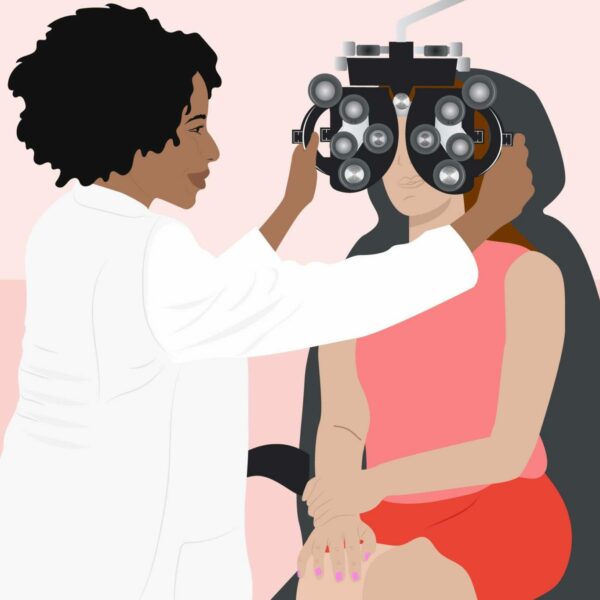In honor of World IBD Day, dietitians from three different continents share tips on managing diet and inflammatory bowel disease (IBD).
HOW INFLAMMATORY BOWEL DISEASE CAN AFFECT THE EYES
HOW INFLAMMATORY BOWEL DISEASE CAN AFFECT THE EYES
December 3, 2020
Anne M. Sydor

About half of people who have inflammatory bowel disease (IBD) will also have related problems outside of the digestive system. For about 1 out of 10 people with IBD, these related problems will occur in the eyes either because of the disease or as complications of treatment. Treatment-related eye problems occur in about 1 of 20 people who are treated. Disease-related eye problems occur in about 1 of every 20 people with Crohn’s disease and about 1 of every 30 people with ulcerative colitis. Most eye conditions related to IBD are treatable and unlikely to cause sight loss, but a few (thankfully even less common) have a higher risk of sight loss.
It is important for people with IBD to be aware that eye conditions may be part of their IBD, see an eye doctor (ophthalmologist) regularly, and contact their health care team if they have any eye irritation, redness, or pain. Also, some medications used to treat IBD can affect the eyes. It is important to discuss possible side effects of any medication with the health care provider who prescribes it.
Types of IBD-Related Eye Conditions and Treatments
Keratopathy is the presence of white deposits on the outer layer of the eye. Keratopathy is not painful and does not threaten sight. Usually no treatment is needed.
Dry eyes can be caused by a lack of vitamin A deficiency that occurs in IBD, especially after bowel surgery. This condition is also called keratoconjunctivis sicca, sicca, or KCS. Low production of tears or high evaporation of tears make the eye dry, irritated, and more easily infected. If infection occurs, antibiotics may be needed. Symptoms of dry eye are treated with artificial tears and vitamin A supplements as pills or injections into a muscle are needed to correct lack of vitamin A, which is essential for health.
Episcleritis is a common eye condition that occurs in people with IBD. Tiny blood vessels in the outer coating of the white of the eye, called the episclera, become inflamed and that area becomes red and painful. When it happens, episcleritis tends to come and go with disease flares. Steroid eyedrops and creams that constrict the blood vessels in the eye are used to treat episcleritis when needed.
Uveitis is inflammation of the middle layer of the eye, called the uvea, which causes pain, blurred vision, sensitivity to light, and eye redness. Usually, uveitis improves as an IBD flare improves, but sometimes treatment is needed. Treatment consists of steroid creams and eyedrops, but injections may also be helpful. It is important to treat uveitis because without treatment glaucoma, a disease caused by increased pressure in the eye, can develop and ultimately lead to permanent vision loss.
Scleritis is rare but more serious—without treatment, scleritis can lead to permanent vision loss. In scleritis, inflammation of the the protective outer layer of the eye, called the sclera causes pain in the eye that spreads to the face and scalp and is usually worse at night. In all cases, treatment is necessary, usually with nonsteroidal oral anti-inflammatory drugs (NSAIDs). However, NSAIDs can worsen IBD and long-term steroid use has serious side effects. If scleritis continues or happens again, immune suppressants to treat both the scleritis and IBD may be needed.
Inflammation may also develop in the retina (the back of the eye) or the optic nerve, although this is very infrequent. Retinal and optic nerve inflammation causes visual disturbances and temporary to permanent vision loss. Anyone with visual disturbances should be seen in an emergency room the first time it occurs.
Medication-Related Eye Conditions in IBD
Some immune suppressants that are used to treat IBD can cause uveitis or optic nerve problems and blood clots in the blood vessels within the eye. If this occurs, the medicine used may need to be changed and steroids may have to be used to treat the uveitis. Methotrexate, a commonly used treatment for IBD, may lead to eye irritation. Steroid treatments can cause cataracts and open-angle glaucoma, which both have a risk of vision loss.
Conclusion
Although most eye problems that occur in people with IBD are easy to treat and do not have long-term risks, a few rare conditions can lead to loss of vision. Anyone with IBD who notices eye irritation or inflammation should talk to their health care providers right away. Seeing an eye doctor regularly is a good idea. Understanding the eye complications of IBD is important—it can lead to early diagnosis and successful treatment.
SUBSCRIBE TO GHLF
RELATED POST AND PAGES
_
Was this article helpful?
YesNo




